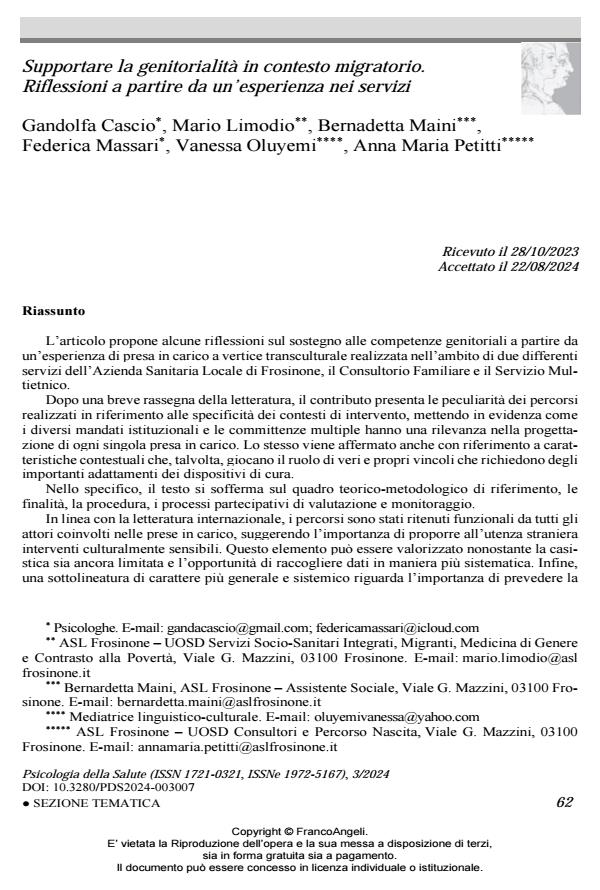Supportare la genitorialità in contesto migratorio. Riflessioni a partire da un’esperienza nei servizi
Titolo Rivista PSICOLOGIA DELLA SALUTE
Autori/Curatori Gandolfa Cascio, Mario Limodio, Bernadetta Maini, Federica Massari, Vanessa Oluyemi, Anna Maria Petitti
Anno di pubblicazione 2024 Fascicolo 2024/3
Lingua Italiano Numero pagine 15 P. 62-76 Dimensione file 243 KB
DOI 10.3280/PDS2024-003007
Il DOI è il codice a barre della proprietà intellettuale: per saperne di più
clicca qui
Qui sotto puoi vedere in anteprima la prima pagina di questo articolo.
Se questo articolo ti interessa, lo puoi acquistare (e scaricare in formato pdf) seguendo le facili indicazioni per acquistare il download credit. Acquista Download Credits per scaricare questo Articolo in formato PDF

FrancoAngeli è membro della Publishers International Linking Association, Inc (PILA), associazione indipendente e non profit per facilitare (attraverso i servizi tecnologici implementati da CrossRef.org) l’accesso degli studiosi ai contenuti digitali nelle pubblicazioni professionali e scientifiche.
L’articolo propone alcune riflessioni sul sostegno alle competenze genitoriali a partire da un’esperienza di presa in carico a vertice transculturale realizzata nell’ambito di due differenti servizi dell’Azienda Sanitaria Locale di Frosinone, il Consultorio Familiare e il Servizio Mul-tietnico. Dopo una breve rassegna della letteratura, il contributo presenta le peculiarità dei percorsi realizzati in riferimento alle specificità dei contesti di intervento, mettendo in evidenza come i diversi mandati istituzionali e le committenze multiple hanno una rilevanza nella progettazione di ogni singola presa in carico. Lo stesso viene affermato anche con riferimento a caratteristi-che contestuali che, talvolta, giocano il ruolo di veri e propri vincoli che richiedono degli im-portanti adattamenti dei dispositivi di cura. Nello specifico, il testo si sofferma sul quadro teorico-metodologico di riferimento, le fina-lità, la procedura, i processi partecipativi di valutazione e monitoraggio. In linea con la letteratura internazionale, i percorsi sono stati ritenuti funzionali da tutti gli attori coinvolti nelle prese in carico, suggerendo l’importanza di proporre all’utenza straniera interventi culturalmente sensibili. Questo elemento può essere valorizzato nonostante la casisti-ca sia ancora limitata e l’opportunità di raccogliere dati in maniera più sistematica. Infine, una sottolineatura di carattere più generale e sistemico riguarda l’importanza di prevedere la media-zione linguistico-culturale secondo modalità che ne assicurino la continuità dell’intervento nel tempo.
Parole chiave:migrazione, famiglie migranti, supporto alla genitorialità, competenze genitoria-li, approccio transculturale
Gandolfa Cascio, Mario Limodio, Bernadetta Maini, Federica Massari, Vanessa Oluyemi, Anna Maria Petitti, Supportare la genitorialità in contesto migratorio. Riflessioni a partire da un’esperienza nei servizi in "PSICOLOGIA DELLA SALUTE" 3/2024, pp 62-76, DOI: 10.3280/PDS2024-003007